Nestle's Employee Relations Policy: Legislative Requirements, Strategies, and Stakeholder Relations
VerifiedAdded on 2023/05/30
|7
|1626
|116
AI Summary
This report discusses Nestle's Employee Relations Policy, including legislative requirements, strategies for managing negotiations and employment contracts, high standards of employee and ethical behavior, and effective relations with stakeholders and employees. The report examines Nestle's compliance with EEO requirements and the company's commitment to diversity and inclusion. The report also explores Nestle's engagement with stakeholders and the company's efforts to create shared value.
Contribute Materials
Your contribution can guide someone’s learning journey. Share your
documents today.
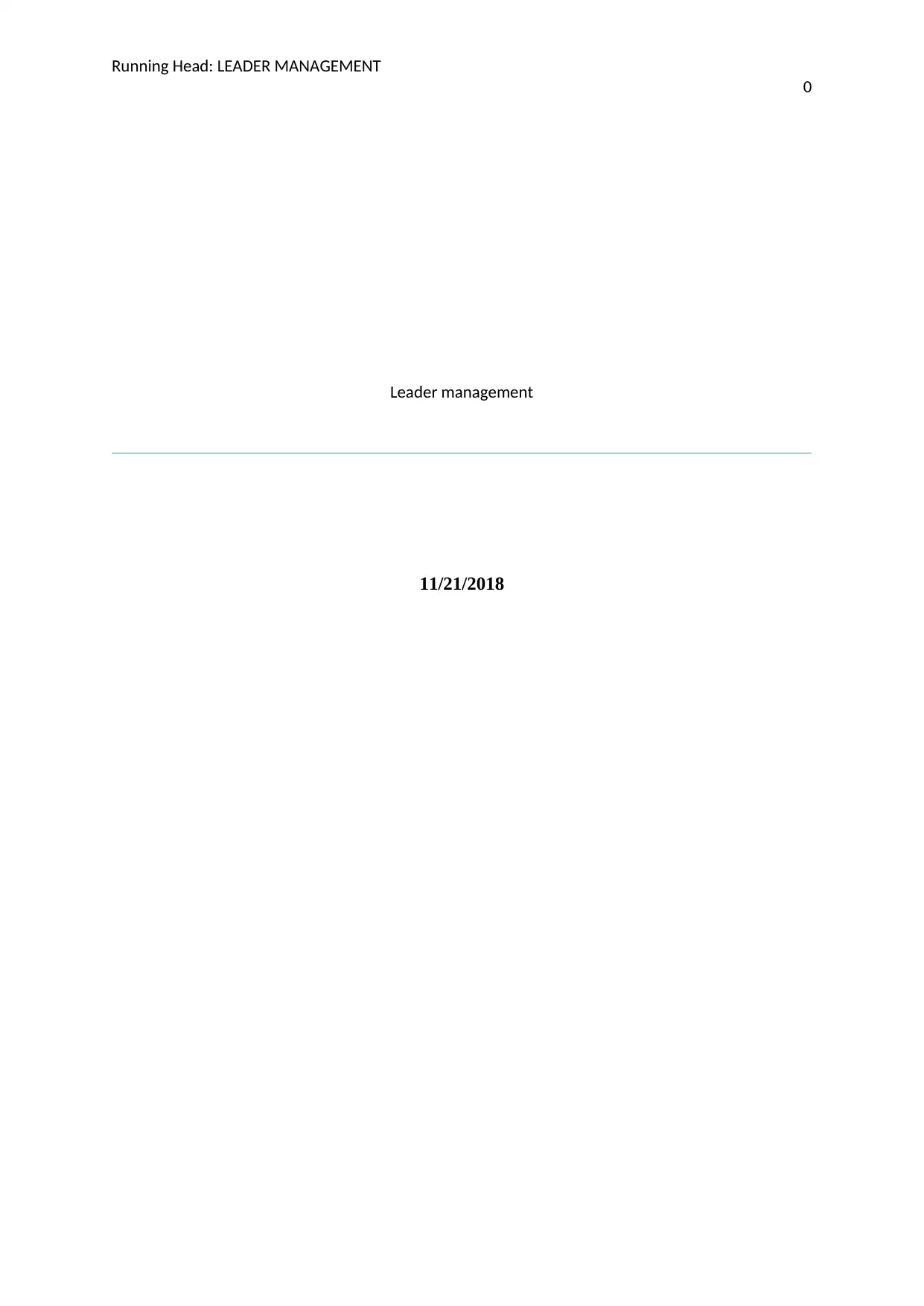
Running Head: LEADER MANAGEMENT
0
Leader management
11/21/2018
0
Leader management
11/21/2018
Secure Best Marks with AI Grader
Need help grading? Try our AI Grader for instant feedback on your assignments.
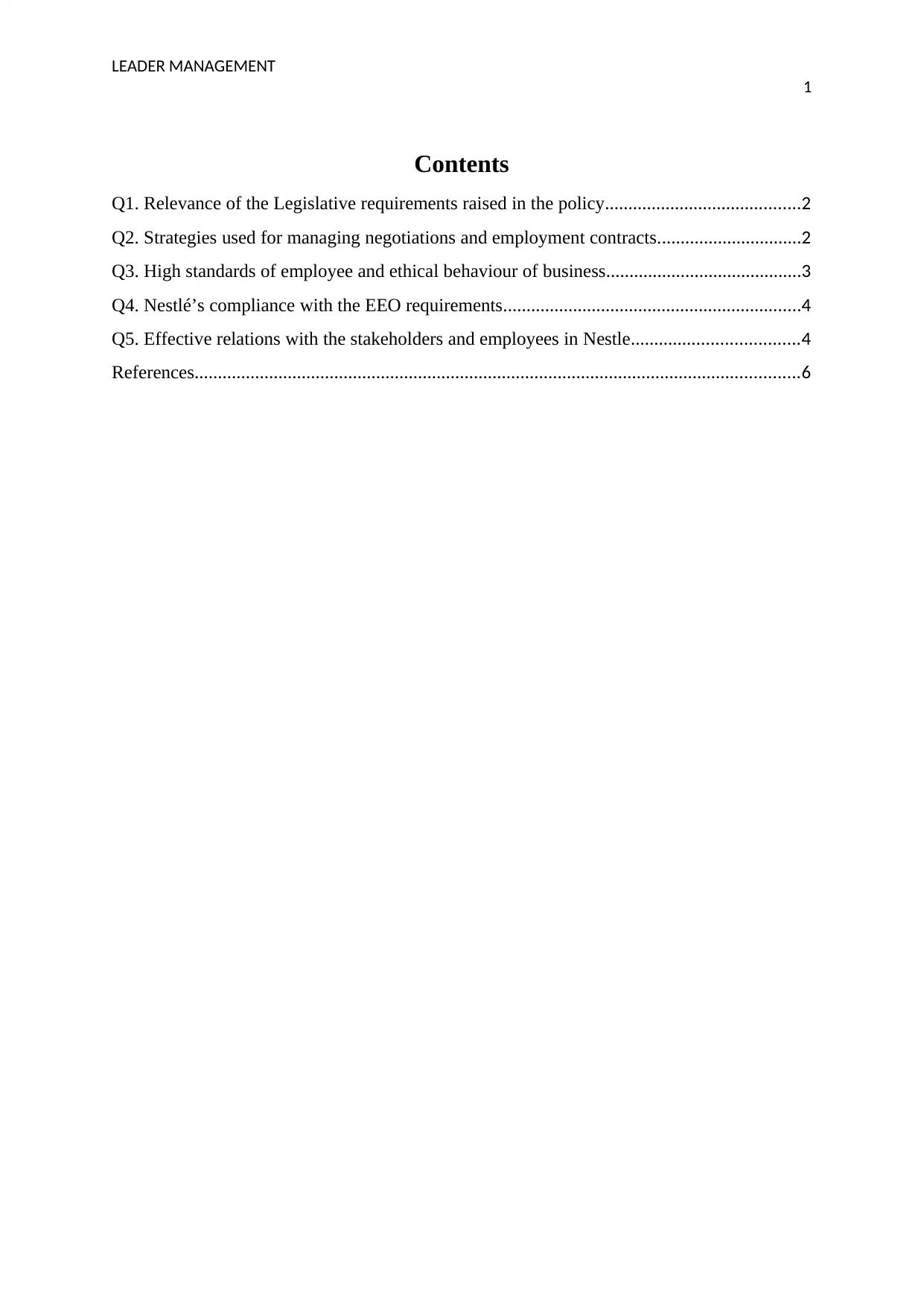
LEADER MANAGEMENT
1
Contents
Q1. Relevance of the Legislative requirements raised in the policy..........................................2
Q2. Strategies used for managing negotiations and employment contracts...............................2
Q3. High standards of employee and ethical behaviour of business..........................................3
Q4. Nestlé’s compliance with the EEO requirements................................................................4
Q5. Effective relations with the stakeholders and employees in Nestle....................................4
References..................................................................................................................................6
1
Contents
Q1. Relevance of the Legislative requirements raised in the policy..........................................2
Q2. Strategies used for managing negotiations and employment contracts...............................2
Q3. High standards of employee and ethical behaviour of business..........................................3
Q4. Nestlé’s compliance with the EEO requirements................................................................4
Q5. Effective relations with the stakeholders and employees in Nestle....................................4
References..................................................................................................................................6
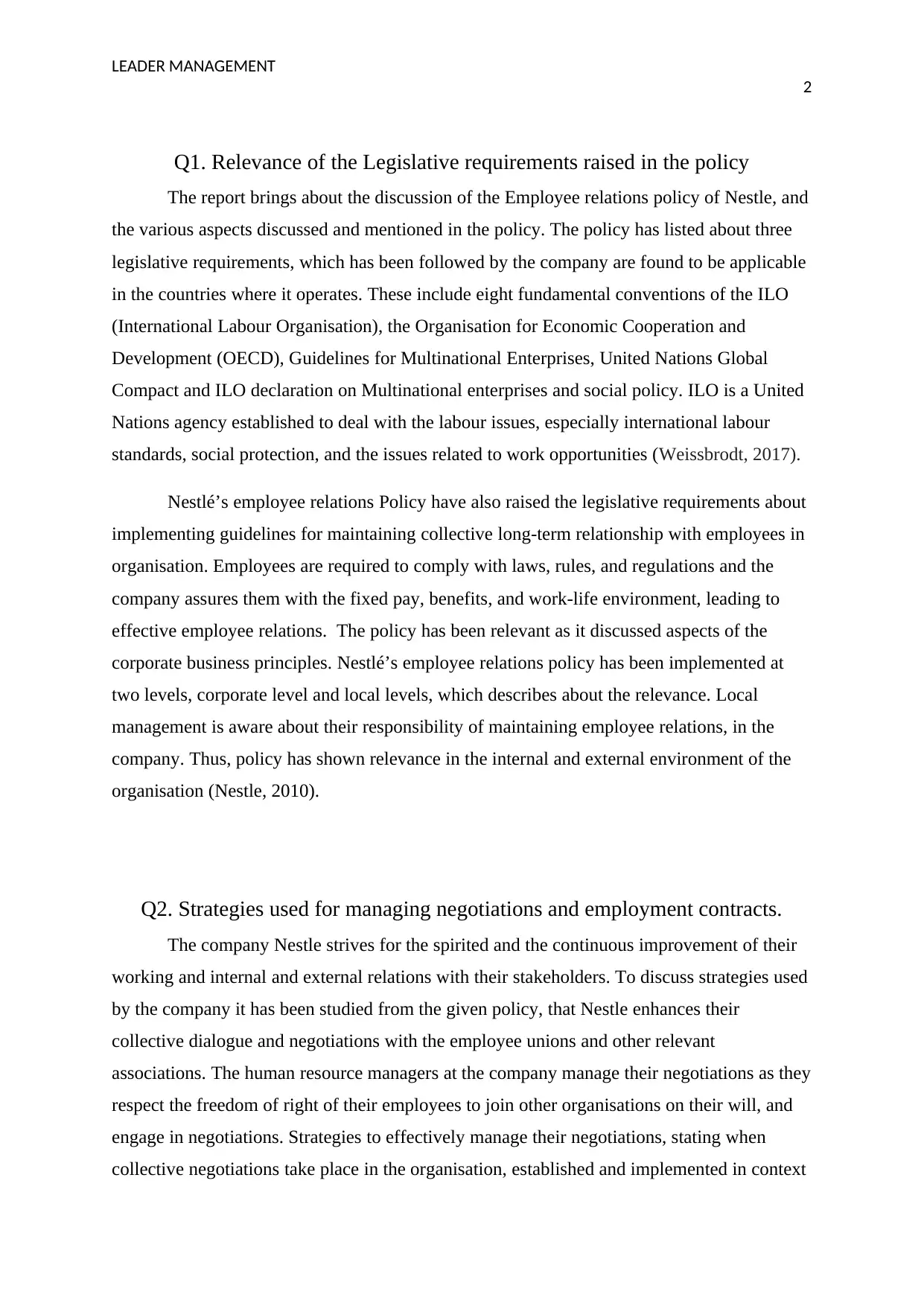
LEADER MANAGEMENT
2
Q1. Relevance of the Legislative requirements raised in the policy
The report brings about the discussion of the Employee relations policy of Nestle, and
the various aspects discussed and mentioned in the policy. The policy has listed about three
legislative requirements, which has been followed by the company are found to be applicable
in the countries where it operates. These include eight fundamental conventions of the ILO
(International Labour Organisation), the Organisation for Economic Cooperation and
Development (OECD), Guidelines for Multinational Enterprises, United Nations Global
Compact and ILO declaration on Multinational enterprises and social policy. ILO is a United
Nations agency established to deal with the labour issues, especially international labour
standards, social protection, and the issues related to work opportunities (Weissbrodt, 2017).
Nestlé’s employee relations Policy have also raised the legislative requirements about
implementing guidelines for maintaining collective long-term relationship with employees in
organisation. Employees are required to comply with laws, rules, and regulations and the
company assures them with the fixed pay, benefits, and work-life environment, leading to
effective employee relations. The policy has been relevant as it discussed aspects of the
corporate business principles. Nestlé’s employee relations policy has been implemented at
two levels, corporate level and local levels, which describes about the relevance. Local
management is aware about their responsibility of maintaining employee relations, in the
company. Thus, policy has shown relevance in the internal and external environment of the
organisation (Nestle, 2010).
Q2. Strategies used for managing negotiations and employment contracts.
The company Nestle strives for the spirited and the continuous improvement of their
working and internal and external relations with their stakeholders. To discuss strategies used
by the company it has been studied from the given policy, that Nestle enhances their
collective dialogue and negotiations with the employee unions and other relevant
associations. The human resource managers at the company manage their negotiations as they
respect the freedom of right of their employees to join other organisations on their will, and
engage in negotiations. Strategies to effectively manage their negotiations, stating when
collective negotiations take place in the organisation, established and implemented in context
2
Q1. Relevance of the Legislative requirements raised in the policy
The report brings about the discussion of the Employee relations policy of Nestle, and
the various aspects discussed and mentioned in the policy. The policy has listed about three
legislative requirements, which has been followed by the company are found to be applicable
in the countries where it operates. These include eight fundamental conventions of the ILO
(International Labour Organisation), the Organisation for Economic Cooperation and
Development (OECD), Guidelines for Multinational Enterprises, United Nations Global
Compact and ILO declaration on Multinational enterprises and social policy. ILO is a United
Nations agency established to deal with the labour issues, especially international labour
standards, social protection, and the issues related to work opportunities (Weissbrodt, 2017).
Nestlé’s employee relations Policy have also raised the legislative requirements about
implementing guidelines for maintaining collective long-term relationship with employees in
organisation. Employees are required to comply with laws, rules, and regulations and the
company assures them with the fixed pay, benefits, and work-life environment, leading to
effective employee relations. The policy has been relevant as it discussed aspects of the
corporate business principles. Nestlé’s employee relations policy has been implemented at
two levels, corporate level and local levels, which describes about the relevance. Local
management is aware about their responsibility of maintaining employee relations, in the
company. Thus, policy has shown relevance in the internal and external environment of the
organisation (Nestle, 2010).
Q2. Strategies used for managing negotiations and employment contracts.
The company Nestle strives for the spirited and the continuous improvement of their
working and internal and external relations with their stakeholders. To discuss strategies used
by the company it has been studied from the given policy, that Nestle enhances their
collective dialogue and negotiations with the employee unions and other relevant
associations. The human resource managers at the company manage their negotiations as they
respect the freedom of right of their employees to join other organisations on their will, and
engage in negotiations. Strategies to effectively manage their negotiations, stating when
collective negotiations take place in the organisation, established and implemented in context
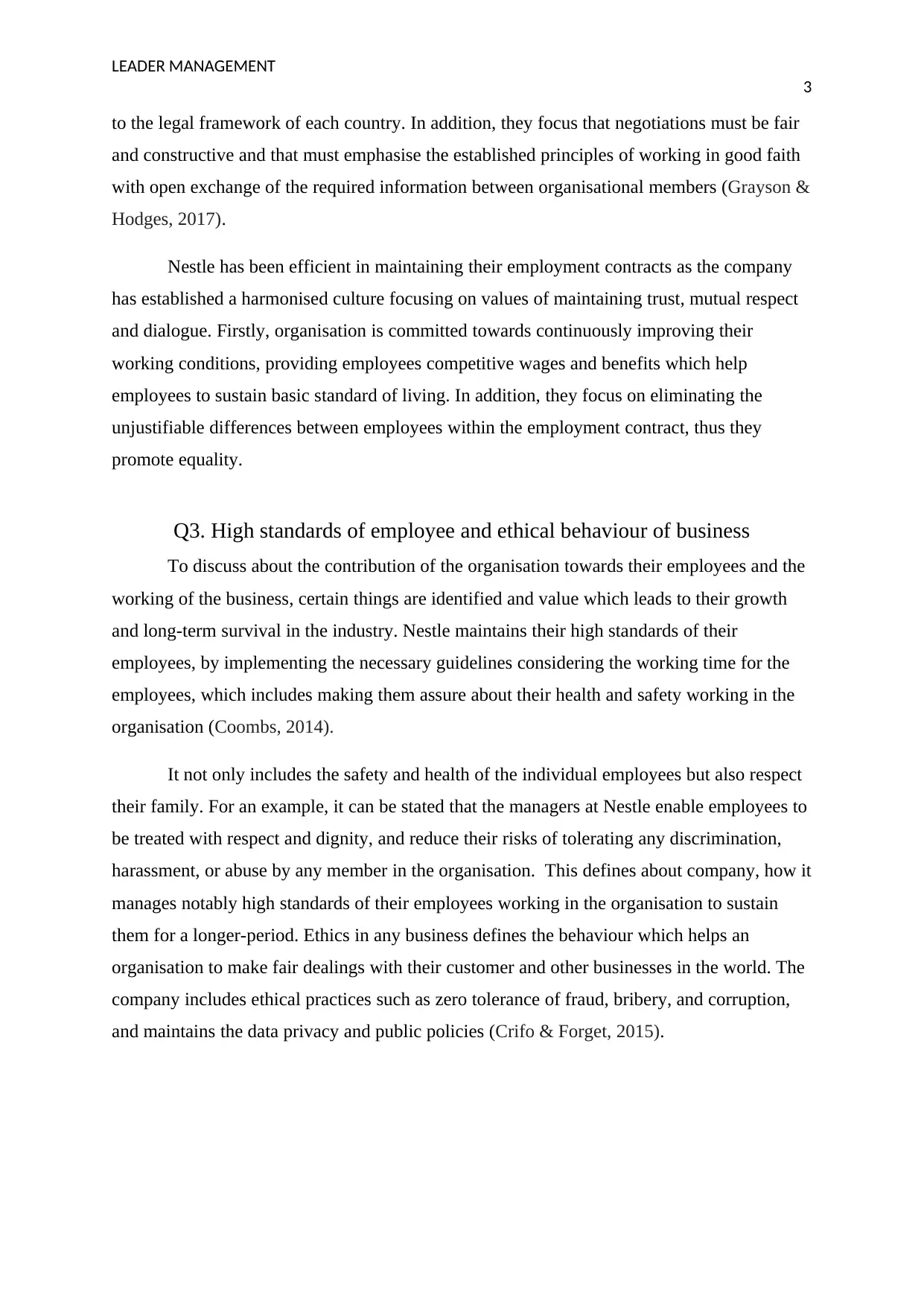
LEADER MANAGEMENT
3
to the legal framework of each country. In addition, they focus that negotiations must be fair
and constructive and that must emphasise the established principles of working in good faith
with open exchange of the required information between organisational members (Grayson &
Hodges, 2017).
Nestle has been efficient in maintaining their employment contracts as the company
has established a harmonised culture focusing on values of maintaining trust, mutual respect
and dialogue. Firstly, organisation is committed towards continuously improving their
working conditions, providing employees competitive wages and benefits which help
employees to sustain basic standard of living. In addition, they focus on eliminating the
unjustifiable differences between employees within the employment contract, thus they
promote equality.
Q3. High standards of employee and ethical behaviour of business
To discuss about the contribution of the organisation towards their employees and the
working of the business, certain things are identified and value which leads to their growth
and long-term survival in the industry. Nestle maintains their high standards of their
employees, by implementing the necessary guidelines considering the working time for the
employees, which includes making them assure about their health and safety working in the
organisation (Coombs, 2014).
It not only includes the safety and health of the individual employees but also respect
their family. For an example, it can be stated that the managers at Nestle enable employees to
be treated with respect and dignity, and reduce their risks of tolerating any discrimination,
harassment, or abuse by any member in the organisation. This defines about company, how it
manages notably high standards of their employees working in the organisation to sustain
them for a longer-period. Ethics in any business defines the behaviour which helps an
organisation to make fair dealings with their customer and other businesses in the world. The
company includes ethical practices such as zero tolerance of fraud, bribery, and corruption,
and maintains the data privacy and public policies (Crifo & Forget, 2015).
3
to the legal framework of each country. In addition, they focus that negotiations must be fair
and constructive and that must emphasise the established principles of working in good faith
with open exchange of the required information between organisational members (Grayson &
Hodges, 2017).
Nestle has been efficient in maintaining their employment contracts as the company
has established a harmonised culture focusing on values of maintaining trust, mutual respect
and dialogue. Firstly, organisation is committed towards continuously improving their
working conditions, providing employees competitive wages and benefits which help
employees to sustain basic standard of living. In addition, they focus on eliminating the
unjustifiable differences between employees within the employment contract, thus they
promote equality.
Q3. High standards of employee and ethical behaviour of business
To discuss about the contribution of the organisation towards their employees and the
working of the business, certain things are identified and value which leads to their growth
and long-term survival in the industry. Nestle maintains their high standards of their
employees, by implementing the necessary guidelines considering the working time for the
employees, which includes making them assure about their health and safety working in the
organisation (Coombs, 2014).
It not only includes the safety and health of the individual employees but also respect
their family. For an example, it can be stated that the managers at Nestle enable employees to
be treated with respect and dignity, and reduce their risks of tolerating any discrimination,
harassment, or abuse by any member in the organisation. This defines about company, how it
manages notably high standards of their employees working in the organisation to sustain
them for a longer-period. Ethics in any business defines the behaviour which helps an
organisation to make fair dealings with their customer and other businesses in the world. The
company includes ethical practices such as zero tolerance of fraud, bribery, and corruption,
and maintains the data privacy and public policies (Crifo & Forget, 2015).
Secure Best Marks with AI Grader
Need help grading? Try our AI Grader for instant feedback on your assignments.
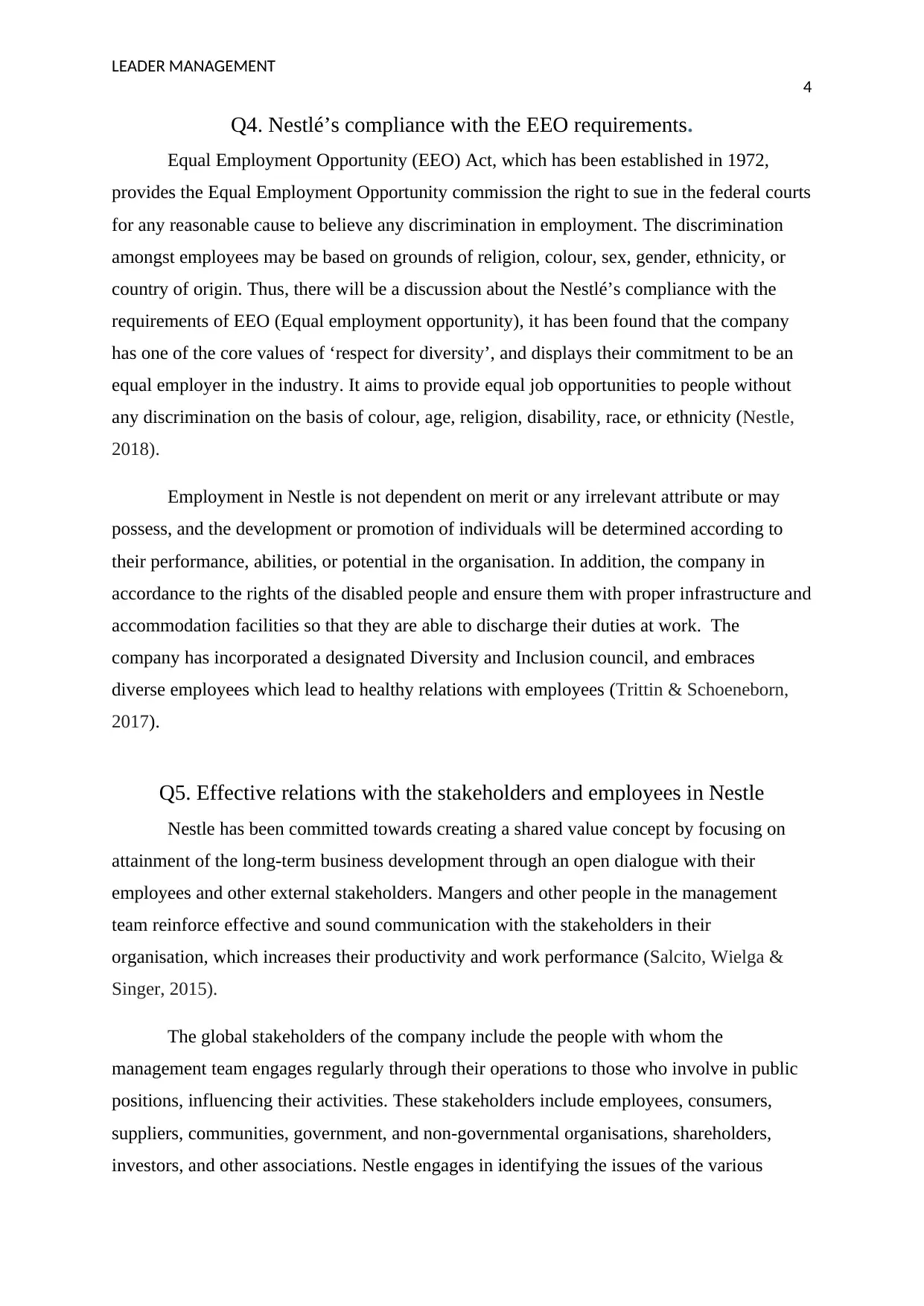
LEADER MANAGEMENT
4
Q4. Nestlé’s compliance with the EEO requirements.
Equal Employment Opportunity (EEO) Act, which has been established in 1972,
provides the Equal Employment Opportunity commission the right to sue in the federal courts
for any reasonable cause to believe any discrimination in employment. The discrimination
amongst employees may be based on grounds of religion, colour, sex, gender, ethnicity, or
country of origin. Thus, there will be a discussion about the Nestlé’s compliance with the
requirements of EEO (Equal employment opportunity), it has been found that the company
has one of the core values of ‘respect for diversity’, and displays their commitment to be an
equal employer in the industry. It aims to provide equal job opportunities to people without
any discrimination on the basis of colour, age, religion, disability, race, or ethnicity (Nestle,
2018).
Employment in Nestle is not dependent on merit or any irrelevant attribute or may
possess, and the development or promotion of individuals will be determined according to
their performance, abilities, or potential in the organisation. In addition, the company in
accordance to the rights of the disabled people and ensure them with proper infrastructure and
accommodation facilities so that they are able to discharge their duties at work. The
company has incorporated a designated Diversity and Inclusion council, and embraces
diverse employees which lead to healthy relations with employees (Trittin & Schoeneborn,
2017).
Q5. Effective relations with the stakeholders and employees in Nestle
Nestle has been committed towards creating a shared value concept by focusing on
attainment of the long-term business development through an open dialogue with their
employees and other external stakeholders. Mangers and other people in the management
team reinforce effective and sound communication with the stakeholders in their
organisation, which increases their productivity and work performance (Salcito, Wielga &
Singer, 2015).
The global stakeholders of the company include the people with whom the
management team engages regularly through their operations to those who involve in public
positions, influencing their activities. These stakeholders include employees, consumers,
suppliers, communities, government, and non-governmental organisations, shareholders,
investors, and other associations. Nestle engages in identifying the issues of the various
4
Q4. Nestlé’s compliance with the EEO requirements.
Equal Employment Opportunity (EEO) Act, which has been established in 1972,
provides the Equal Employment Opportunity commission the right to sue in the federal courts
for any reasonable cause to believe any discrimination in employment. The discrimination
amongst employees may be based on grounds of religion, colour, sex, gender, ethnicity, or
country of origin. Thus, there will be a discussion about the Nestlé’s compliance with the
requirements of EEO (Equal employment opportunity), it has been found that the company
has one of the core values of ‘respect for diversity’, and displays their commitment to be an
equal employer in the industry. It aims to provide equal job opportunities to people without
any discrimination on the basis of colour, age, religion, disability, race, or ethnicity (Nestle,
2018).
Employment in Nestle is not dependent on merit or any irrelevant attribute or may
possess, and the development or promotion of individuals will be determined according to
their performance, abilities, or potential in the organisation. In addition, the company in
accordance to the rights of the disabled people and ensure them with proper infrastructure and
accommodation facilities so that they are able to discharge their duties at work. The
company has incorporated a designated Diversity and Inclusion council, and embraces
diverse employees which lead to healthy relations with employees (Trittin & Schoeneborn,
2017).
Q5. Effective relations with the stakeholders and employees in Nestle
Nestle has been committed towards creating a shared value concept by focusing on
attainment of the long-term business development through an open dialogue with their
employees and other external stakeholders. Mangers and other people in the management
team reinforce effective and sound communication with the stakeholders in their
organisation, which increases their productivity and work performance (Salcito, Wielga &
Singer, 2015).
The global stakeholders of the company include the people with whom the
management team engages regularly through their operations to those who involve in public
positions, influencing their activities. These stakeholders include employees, consumers,
suppliers, communities, government, and non-governmental organisations, shareholders,
investors, and other associations. Nestle engages in identifying the issues of the various
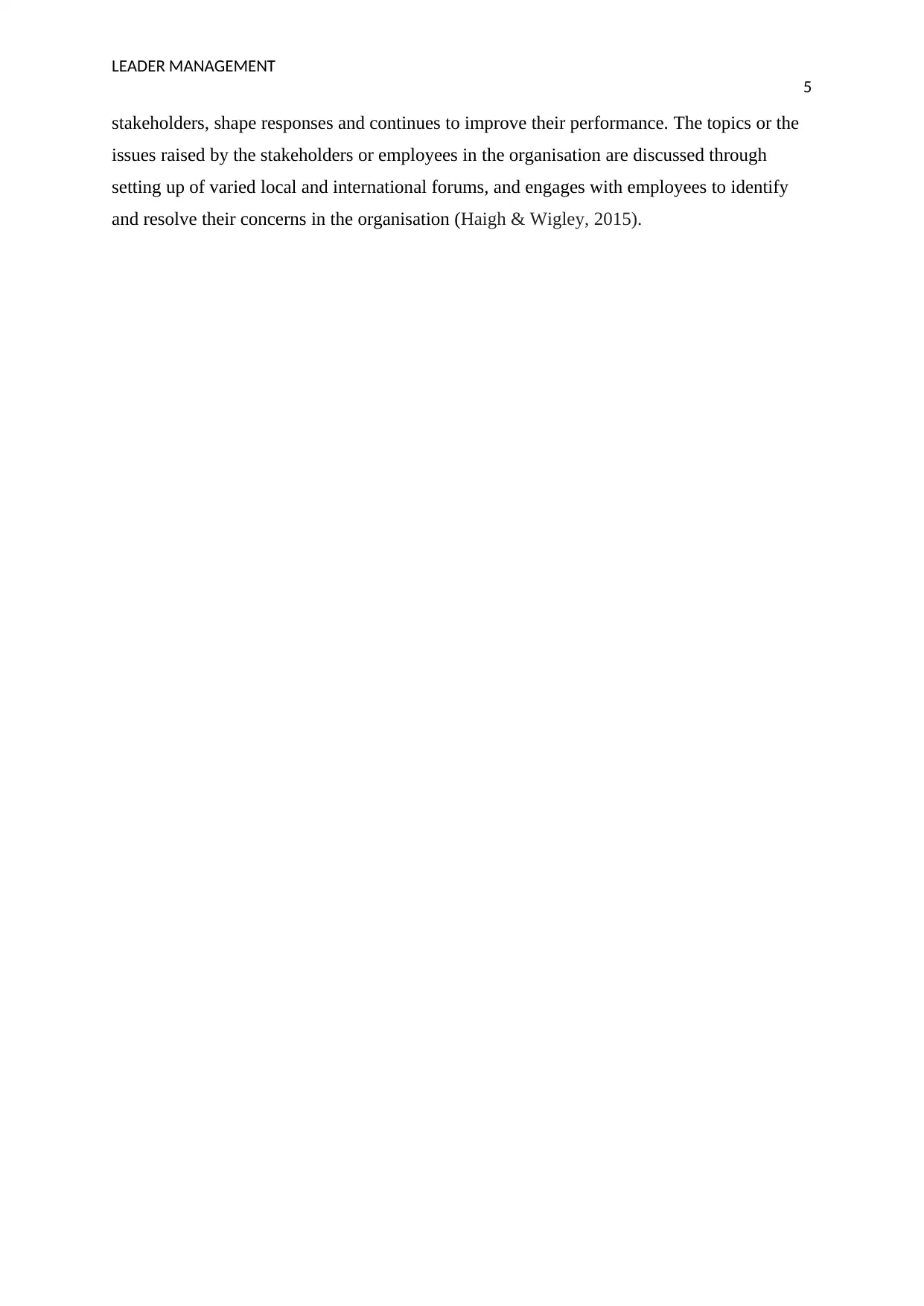
LEADER MANAGEMENT
5
stakeholders, shape responses and continues to improve their performance. The topics or the
issues raised by the stakeholders or employees in the organisation are discussed through
setting up of varied local and international forums, and engages with employees to identify
and resolve their concerns in the organisation (Haigh & Wigley, 2015).
5
stakeholders, shape responses and continues to improve their performance. The topics or the
issues raised by the stakeholders or employees in the organisation are discussed through
setting up of varied local and international forums, and engages with employees to identify
and resolve their concerns in the organisation (Haigh & Wigley, 2015).
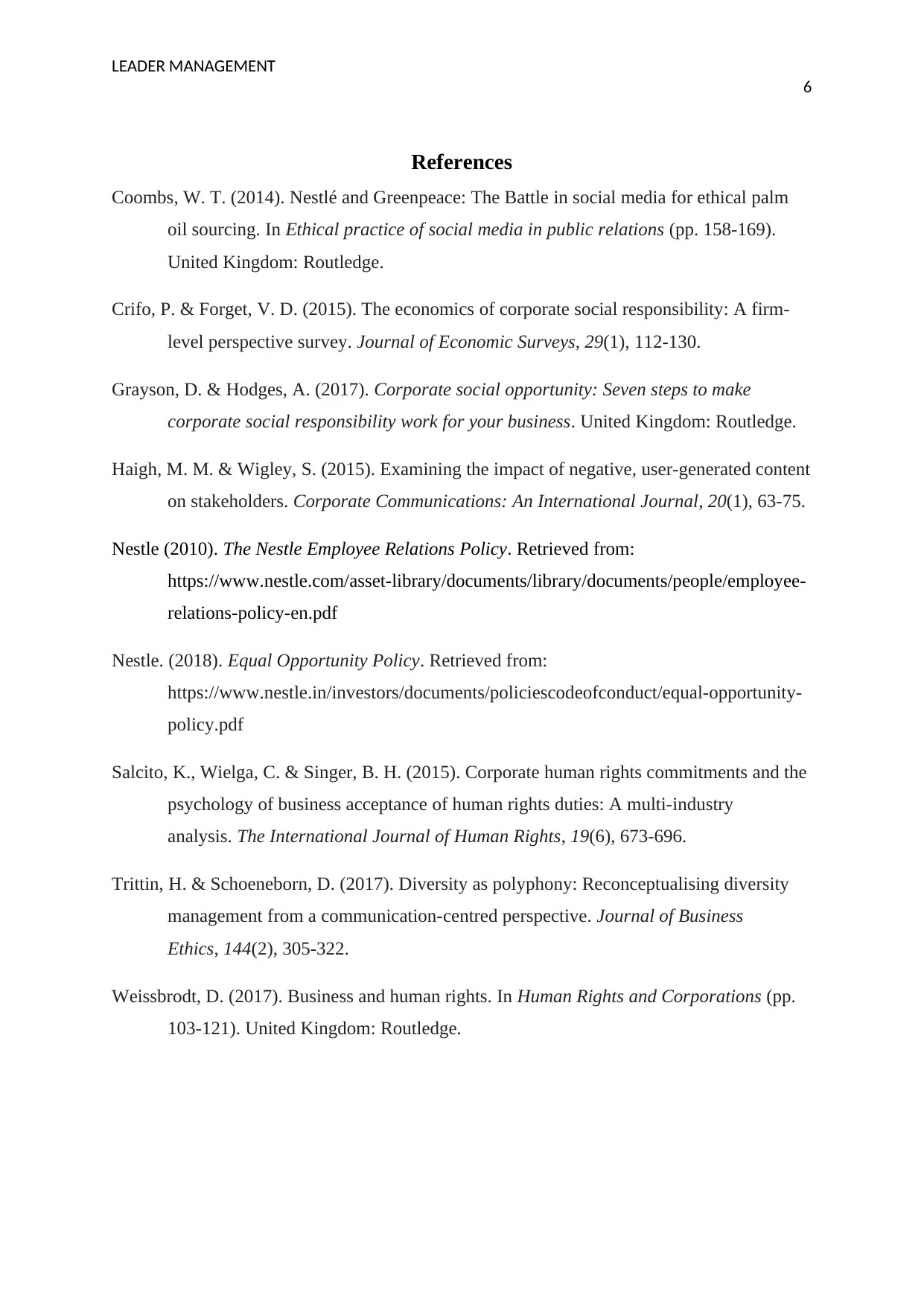
LEADER MANAGEMENT
6
References
Coombs, W. T. (2014). Nestlé and Greenpeace: The Battle in social media for ethical palm
oil sourcing. In Ethical practice of social media in public relations (pp. 158-169).
United Kingdom: Routledge.
Crifo, P. & Forget, V. D. (2015). The economics of corporate social responsibility: A firm‐
level perspective survey. Journal of Economic Surveys, 29(1), 112-130.
Grayson, D. & Hodges, A. (2017). Corporate social opportunity: Seven steps to make
corporate social responsibility work for your business. United Kingdom: Routledge.
Haigh, M. M. & Wigley, S. (2015). Examining the impact of negative, user-generated content
on stakeholders. Corporate Communications: An International Journal, 20(1), 63-75.
Nestle (2010). The Nestle Employee Relations Policy. Retrieved from:
https://www.nestle.com/asset-library/documents/library/documents/people/employee-
relations-policy-en.pdf
Nestle. (2018). Equal Opportunity Policy. Retrieved from:
https://www.nestle.in/investors/documents/policiescodeofconduct/equal-opportunity-
policy.pdf
Salcito, K., Wielga, C. & Singer, B. H. (2015). Corporate human rights commitments and the
psychology of business acceptance of human rights duties: A multi-industry
analysis. The International Journal of Human Rights, 19(6), 673-696.
Trittin, H. & Schoeneborn, D. (2017). Diversity as polyphony: Reconceptualising diversity
management from a communication-centred perspective. Journal of Business
Ethics, 144(2), 305-322.
Weissbrodt, D. (2017). Business and human rights. In Human Rights and Corporations (pp.
103-121). United Kingdom: Routledge.
6
References
Coombs, W. T. (2014). Nestlé and Greenpeace: The Battle in social media for ethical palm
oil sourcing. In Ethical practice of social media in public relations (pp. 158-169).
United Kingdom: Routledge.
Crifo, P. & Forget, V. D. (2015). The economics of corporate social responsibility: A firm‐
level perspective survey. Journal of Economic Surveys, 29(1), 112-130.
Grayson, D. & Hodges, A. (2017). Corporate social opportunity: Seven steps to make
corporate social responsibility work for your business. United Kingdom: Routledge.
Haigh, M. M. & Wigley, S. (2015). Examining the impact of negative, user-generated content
on stakeholders. Corporate Communications: An International Journal, 20(1), 63-75.
Nestle (2010). The Nestle Employee Relations Policy. Retrieved from:
https://www.nestle.com/asset-library/documents/library/documents/people/employee-
relations-policy-en.pdf
Nestle. (2018). Equal Opportunity Policy. Retrieved from:
https://www.nestle.in/investors/documents/policiescodeofconduct/equal-opportunity-
policy.pdf
Salcito, K., Wielga, C. & Singer, B. H. (2015). Corporate human rights commitments and the
psychology of business acceptance of human rights duties: A multi-industry
analysis. The International Journal of Human Rights, 19(6), 673-696.
Trittin, H. & Schoeneborn, D. (2017). Diversity as polyphony: Reconceptualising diversity
management from a communication-centred perspective. Journal of Business
Ethics, 144(2), 305-322.
Weissbrodt, D. (2017). Business and human rights. In Human Rights and Corporations (pp.
103-121). United Kingdom: Routledge.
1 out of 7
Related Documents
Your All-in-One AI-Powered Toolkit for Academic Success.
+13062052269
info@desklib.com
Available 24*7 on WhatsApp / Email
![[object Object]](/_next/static/media/star-bottom.7253800d.svg)
Unlock your academic potential
© 2024 | Zucol Services PVT LTD | All rights reserved.





